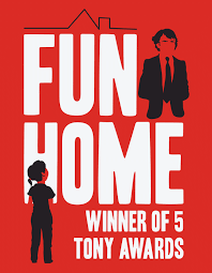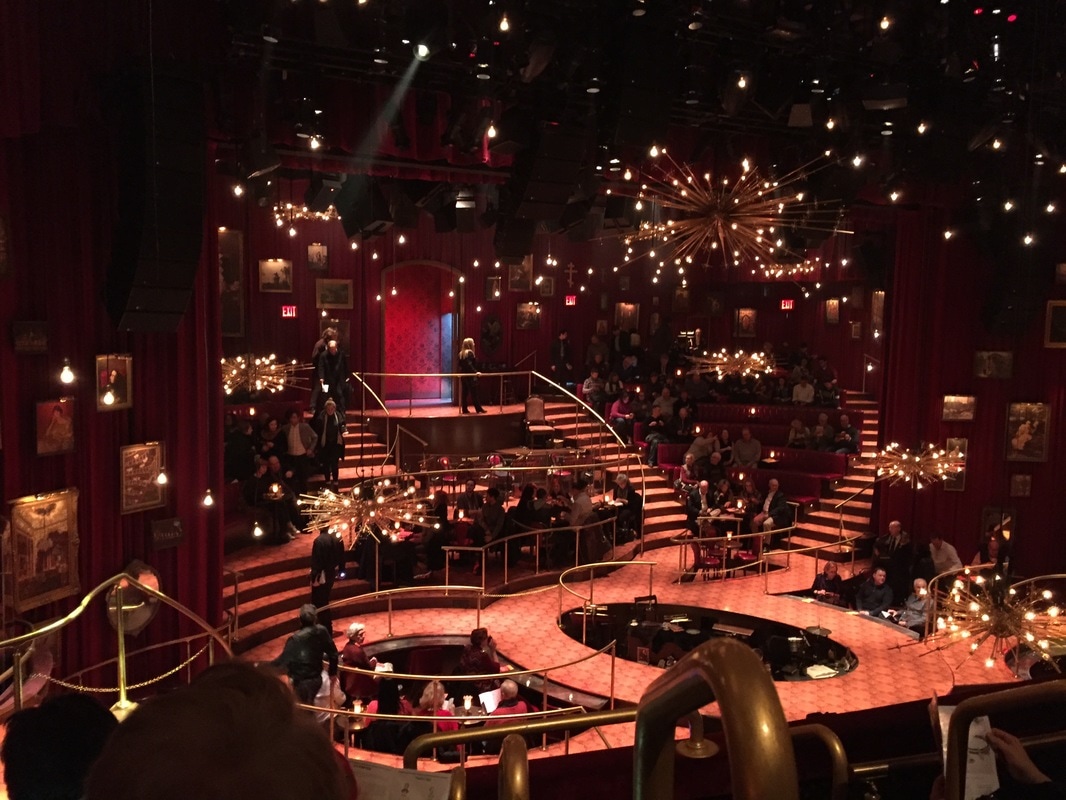 24 Hours in Liverpool: A Quick Tour of Beatlemania, Museums, and Other Sightsby Randi / August 15, 2018
24 Hours in Liverpool: A Quick Tour of Beatlemania, Museums, and Other Sightsby Randi / August 15, 2018It’s Theatre Thursday! Today we are talking about the musical Fun Home, which is playing at London’s Young Vic until September 1.
I haven’t been this nervous about a show in a long time. Experiencing the original Broadway production of Fun Home in 2015 was one of the most magical theatrical moments I’ve had. Everything about it was absolute perfection, including the first truly great use of the Circle in the Square Theatre’s setup in the round. I worried that the show would lose some of its power and emotional depth without that original cast that I so adored, without the circular theatre, without the extra tinge of greatness that Broadway musicals tend to have. Fortunately, Fun Home is in good hands at London’s Young Vic theatre, such good hands that I was dehydrated for days from all the crying.
I haven’t been this nervous about a show in a long time. Experiencing the original Broadway production of Fun Home in 2015 was one of the most magical theatrical moments I’ve had. Everything about it was absolute perfection, including the first truly great use of the Circle in the Square Theatre’s setup in the round. I worried that the show would lose some of its power and emotional depth without that original cast that I so adored, without the circular theatre, without the extra tinge of greatness that Broadway musicals tend to have. Fortunately, Fun Home is in good hands at London’s Young Vic theatre, such good hands that I was dehydrated for days from all the crying.
Fun Home is the musical adaptation of Alison Bechdel’s 2006 autobiographical graphic (autobiographical maybe?) of the same name, in which she delves into her childhood and her relationship with her father, who she learned was gay soon after she herself came out, and shortly before his suicide. The musical features Alison at three ages – as an adult, a new college student (Medium Alison), and as a 10-year-old kid (Small Alison). Now age 43, Alison, the ‘lesbian cartoonist’, as she calls herself, is sorting through her father’s old belongings and other mementos from her old house and her family’s funeral home in order to form her graphic novel. The adult Alison, played by a solid Kaisa Hammarlund, is prodded into memories as she looks at these belongings, and the moments from the two earlier stages of her life play out on the stage before her as she remembers them and starts to document them in her cartoons.
Hammarlund’s Big Alison carried the structure of the play well, with the memories eliciting reactions from her ranging from angry to embarrassed to remorseful. Her anger came when we saw her father stopping Small Alison (Harriet Turnbull) from expressing herself as she wanted to, or from her father’s quick temper and, sometimes, rage. Her embarrassment often came from truly hilarious moments of seeing her college-aged self try to sound smart but end up completely mortified. The great thing about getting different and unique incarnations of this show now is that different characters will shine the brightest depending on the cast and the interpretation. On Broadway, the discovery of the extraordinary Sydney Lucas, a one-in-a-million phenom of a child actor, stole the show with her natural, moving Small Alison and her showstopper ‘Ring of Keys’, where she first sees the kind of butch lesbian that feels so right to her. While that doesn’t mean regularly talented child actors like Turnbull do any less of a moving portrait of Small Alison – she was very good and had the audience completely taken – it means that the balance changes. Here, Medium Alison (Eleanor Kane) stood out as the showstopper, especially with her exceptional performance of “Changing My Major”, where her first sexual experience (with Cherrelle Skeete’s wonderful Joan) forces her to be completely vulnerable, uproariously funny (her little jumps!), and so touching all at once. Hers was a stunning performance and the standout of the night.
Well, one of the standouts; it’s a show full of magical moments. Big Alison’s remorse turned into another such moment in an emotionally resonant and brilliant part (of a show that is entirely brilliant and emotional): during the song “Telephone Wire”, when her memory of her last moments with her father shift his focus from Medium Alison to Big Alison herself, implanting herself into the past to try to futilely change it yet again. Bruce’s gaze moving to the daughter he never got to see as an adult is the kind of moment in a play where, if you are human, you’ll start making little yelpy puppy sounds as you try to suppress your overwhelming sobs. The impact of this moment felt real, and a scene that is heartbreaking simply as written takes on new tragic life.
But even though the story is ostensibly about Alison, it’s her father, Bruce (Zubin Varla), who becomes the focus. Varla takes the complex character of Bruce in a different direction from Michael Cerveris, the original Bruce. Cerveris played him much more natural and reserved, so his anger was shocking, his truly cruel comments to his family seeming unforgivable but infrequent. Varla, on the other hand, had crazy eyes most of the time, so his unstable emotional state was evident and it let his rage fly off the handle more. It was clearer, and for longer, how troubled this Bruce was, and even though I think I prefer the more grounded take – the one that sees the ache in an everyman rather than someone who is more obviously troubled – his interpretation was valid and equally moving. His brilliant introduction – letting the audience see how much he values the beauty he sees in the world – before we see how fast he can descend into rage, is so well done, as are his interactions with all the young men in his life (played by a talented Ashley Samuels) especially when contrasted with how he treats his family in similar situations.
As Alison’s mother Helen, Jenna Russell masterfully harnesses her coldness and uses it as a weapon against her family and her own vulnerability. As usual, Helen’s big song “Days and Days” is set up and performed flawlessly, in a truly remarkable bit of songwriting that lets you understand all of her character’s motivations but completely disagree with her. The big change from the show being presented in the round paid off in this scene, when the set of the house changes into a surprisingly larger, lavish one. I was surprised that it didn’t stay in the round, especially since I’ve seen productions in the round at the Young Vic, and since the original director, Sam Gold, apparently directed this production too. But the changes worked, especially in this scene, and it was interesting to see the show presented from a regular proscenium, although Bruce’s final scenes felt a little static.
The brilliant songwriting is really the star of this show, the reason why it resonates and why every inch of it feels necessary and special. Jeanine Tesori and Lisa Kron’s score and book stand with the best of musical theatre. When I first heard some of it, I thought it was a little too simple. But its lack of big belted numbers or traditional musical theatre moments in favor of personal connection and delicate motifs makes it such a singular achievement in telling such an intimate story. Moments that I thought at first were to lift the somber mood, like when Small Alison imagines her family as a happy singing and dancing one like she watches on TV in “Raincoat of Love”, actually had me crying: It’s not a goofy break from the drama; it’s a heartbreaking look at the kind of happiness this poor child wishes she had. It’s forking sad. Okay so “Come to the Fun Home” is still a very silly moment that lets the kids have fun, but it’s followed by a scene that I don’t remember being so harrowing – when Bruce calls Small Alison in and she sees her first dead body. This small moment was riveting, especially with Big Alison’s anger at remembering this moment and her frustration that she’ll never understand her father’s reasons for doing it.
Such precise, flawless writing feels wrong to change, so the few lyric changes I noticed I don’t really understand. In the beginning, Small Alison originally orders her father to play airplane with her and sings “I wanna play airplane/I wanna put my arms out and fly/Like the Red Baron in the Sopwith Camel”. Apparently that’s a reference to Peanuts, when Snoopy pretends to fly on his doghouse. I don’t know anything about the Sopwith Camel or Snoopy pretending to fly in Peanuts but I know the Red Baron, so the line made overall sense to me – she wants to fly like a plane. To quote my girl Tahani, you can get some of these from context. But in this production, it’s changed to “I wanna put my arms out and fly/like Snoopy and the Red Baron”. Is that really a change that helps people get the reference? I feel like you either know that reference or you don’t, so it’s an odd change for me, dog.
But it’s a tiny non-issue with an overall great production of this incredible show. It’s by far the best musical playing in London right now. I love that such a small show about such specific characters feels so universal, and that it’s getting the chance to be loved by a new audience.
AUDIENCE
Since this is the first (only?) show with a lesbian protagonist and it’s heavily about characters’ sexuality, it’s drawing a more diverse crowd that you see in the theatre usually, which is awesome. But it means some possibly new theatergoers are not used to theatre etiquette. When Medium Alison writes home, “Dear mom and dad, I’m a lesbian”, one or two audience members whooped and shouted YASS. Audiences, I get that it’s amazing when you feel represented in art, but if you want to be a part of the action, become an actor. It is not a YAS moment. In fact, there are no YAS moments in this show. And just for everyone’s edification, don’t talk or sing along or bullshit like that in the theatre unless everyone onstage makes it clear that they want you to do so (e.g. during “No Time At All” in Pippin, and during the curtain call of “Mamma Mia!”. Pretty sure that’s it).
Shout out to the one usher at the Young Vic who was READY to snatch cell phones. We could be friends.
Hammarlund’s Big Alison carried the structure of the play well, with the memories eliciting reactions from her ranging from angry to embarrassed to remorseful. Her anger came when we saw her father stopping Small Alison (Harriet Turnbull) from expressing herself as she wanted to, or from her father’s quick temper and, sometimes, rage. Her embarrassment often came from truly hilarious moments of seeing her college-aged self try to sound smart but end up completely mortified. The great thing about getting different and unique incarnations of this show now is that different characters will shine the brightest depending on the cast and the interpretation. On Broadway, the discovery of the extraordinary Sydney Lucas, a one-in-a-million phenom of a child actor, stole the show with her natural, moving Small Alison and her showstopper ‘Ring of Keys’, where she first sees the kind of butch lesbian that feels so right to her. While that doesn’t mean regularly talented child actors like Turnbull do any less of a moving portrait of Small Alison – she was very good and had the audience completely taken – it means that the balance changes. Here, Medium Alison (Eleanor Kane) stood out as the showstopper, especially with her exceptional performance of “Changing My Major”, where her first sexual experience (with Cherrelle Skeete’s wonderful Joan) forces her to be completely vulnerable, uproariously funny (her little jumps!), and so touching all at once. Hers was a stunning performance and the standout of the night.
Well, one of the standouts; it’s a show full of magical moments. Big Alison’s remorse turned into another such moment in an emotionally resonant and brilliant part (of a show that is entirely brilliant and emotional): during the song “Telephone Wire”, when her memory of her last moments with her father shift his focus from Medium Alison to Big Alison herself, implanting herself into the past to try to futilely change it yet again. Bruce’s gaze moving to the daughter he never got to see as an adult is the kind of moment in a play where, if you are human, you’ll start making little yelpy puppy sounds as you try to suppress your overwhelming sobs. The impact of this moment felt real, and a scene that is heartbreaking simply as written takes on new tragic life.
But even though the story is ostensibly about Alison, it’s her father, Bruce (Zubin Varla), who becomes the focus. Varla takes the complex character of Bruce in a different direction from Michael Cerveris, the original Bruce. Cerveris played him much more natural and reserved, so his anger was shocking, his truly cruel comments to his family seeming unforgivable but infrequent. Varla, on the other hand, had crazy eyes most of the time, so his unstable emotional state was evident and it let his rage fly off the handle more. It was clearer, and for longer, how troubled this Bruce was, and even though I think I prefer the more grounded take – the one that sees the ache in an everyman rather than someone who is more obviously troubled – his interpretation was valid and equally moving. His brilliant introduction – letting the audience see how much he values the beauty he sees in the world – before we see how fast he can descend into rage, is so well done, as are his interactions with all the young men in his life (played by a talented Ashley Samuels) especially when contrasted with how he treats his family in similar situations.
As Alison’s mother Helen, Jenna Russell masterfully harnesses her coldness and uses it as a weapon against her family and her own vulnerability. As usual, Helen’s big song “Days and Days” is set up and performed flawlessly, in a truly remarkable bit of songwriting that lets you understand all of her character’s motivations but completely disagree with her. The big change from the show being presented in the round paid off in this scene, when the set of the house changes into a surprisingly larger, lavish one. I was surprised that it didn’t stay in the round, especially since I’ve seen productions in the round at the Young Vic, and since the original director, Sam Gold, apparently directed this production too. But the changes worked, especially in this scene, and it was interesting to see the show presented from a regular proscenium, although Bruce’s final scenes felt a little static.
The brilliant songwriting is really the star of this show, the reason why it resonates and why every inch of it feels necessary and special. Jeanine Tesori and Lisa Kron’s score and book stand with the best of musical theatre. When I first heard some of it, I thought it was a little too simple. But its lack of big belted numbers or traditional musical theatre moments in favor of personal connection and delicate motifs makes it such a singular achievement in telling such an intimate story. Moments that I thought at first were to lift the somber mood, like when Small Alison imagines her family as a happy singing and dancing one like she watches on TV in “Raincoat of Love”, actually had me crying: It’s not a goofy break from the drama; it’s a heartbreaking look at the kind of happiness this poor child wishes she had. It’s forking sad. Okay so “Come to the Fun Home” is still a very silly moment that lets the kids have fun, but it’s followed by a scene that I don’t remember being so harrowing – when Bruce calls Small Alison in and she sees her first dead body. This small moment was riveting, especially with Big Alison’s anger at remembering this moment and her frustration that she’ll never understand her father’s reasons for doing it.
Such precise, flawless writing feels wrong to change, so the few lyric changes I noticed I don’t really understand. In the beginning, Small Alison originally orders her father to play airplane with her and sings “I wanna play airplane/I wanna put my arms out and fly/Like the Red Baron in the Sopwith Camel”. Apparently that’s a reference to Peanuts, when Snoopy pretends to fly on his doghouse. I don’t know anything about the Sopwith Camel or Snoopy pretending to fly in Peanuts but I know the Red Baron, so the line made overall sense to me – she wants to fly like a plane. To quote my girl Tahani, you can get some of these from context. But in this production, it’s changed to “I wanna put my arms out and fly/like Snoopy and the Red Baron”. Is that really a change that helps people get the reference? I feel like you either know that reference or you don’t, so it’s an odd change for me, dog.
But it’s a tiny non-issue with an overall great production of this incredible show. It’s by far the best musical playing in London right now. I love that such a small show about such specific characters feels so universal, and that it’s getting the chance to be loved by a new audience.
AUDIENCE
Since this is the first (only?) show with a lesbian protagonist and it’s heavily about characters’ sexuality, it’s drawing a more diverse crowd that you see in the theatre usually, which is awesome. But it means some possibly new theatergoers are not used to theatre etiquette. When Medium Alison writes home, “Dear mom and dad, I’m a lesbian”, one or two audience members whooped and shouted YASS. Audiences, I get that it’s amazing when you feel represented in art, but if you want to be a part of the action, become an actor. It is not a YAS moment. In fact, there are no YAS moments in this show. And just for everyone’s edification, don’t talk or sing along or bullshit like that in the theatre unless everyone onstage makes it clear that they want you to do so (e.g. during “No Time At All” in Pippin, and during the curtain call of “Mamma Mia!”. Pretty sure that’s it).
Shout out to the one usher at the Young Vic who was READY to snatch cell phones. We could be friends.







